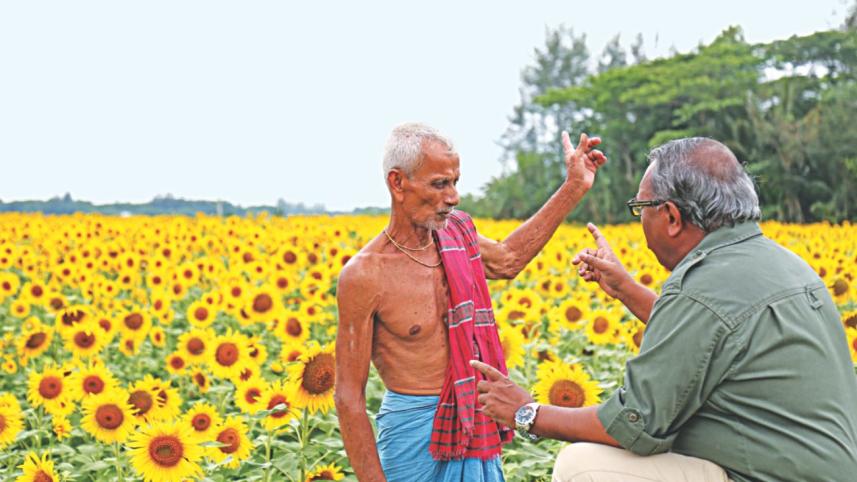Sunflower farming sees success in Noakhali char

I went to Suborno Char in Noakhali district to see the vast fields covered with sunflowers a few days back. Starting an adventurous initiative of sunflower cultivation two years ago, Harun Ur Rashid, a businessman from this area, has by now brought nearly 156 acres of land under the cultivation in Suborno Char.
Many years ago, an initiative was taken to expand sunflower cultivation in the country. However, that didn't bring any success as people didn't greet the oil as 'edible' when they first heard of it. As the time went by, people became much aware about the quality of sunflower oil.
Harun Ur Rashid's objective is to motivate more farmers to cultivate sunflower and make it a cash crop by popularising consumption of sunflower oil in Bangladesh.
Under his initiative, farmers are working on some test plots to cultivate sunflowers and produce its valuable seeds on a large scale.
Going to the sunflower field in Suborno Char reminded me of the 80s when I went to Rangpur to visit sunflower cultivation. During that time, the then British American Tobacco took an initiative to produce edible oil from sunflowers, but that didn't become successful in the end. Dear readers, I also watched a film 'Sunflower', where Sophia Loren acted brilliantly. You could also recall the memories of the vast, gorgeous land, covered with sunflowers. Many of you have already watched it, I'm sure. These memories came alive once again as I was standing in front of the yellow fields of sunflower in Suborno Char.
There was a time when sunflower was cultivated voluntarily in our country. Later on, a few people started cultivating it commercially. No one ever thought that sunflower would be a successful venture in the coastal areas of Bangladesh. When the salinity increased after the onslaught of super cyclones Sidr and Aila, it was the most appropriate time to start sunflower cultivation. However, nobody gave a thought on this. On the other hand, our neighboring country India took steps for sunflower cultivation in saline regions, specifically in the Sundarbans area, located in that country.
A couple of years back, I talked with Prof Dr Anandamoy Pusto of Agronomy department of Bidhanchandra University in West Bengal about the possibility and attributes of sunflower cultivation in saline regions.
"Sunflower is such a crop that can be cultivated at the salinity level of pH 8.5. It can also be cultivated within a very short time, 85-90 days," said Dr Pusto.
"It can be produced from seeds and the quality and percentage of oil extraction is great," he added.
He also said salinity tolerant sunflowers can easily be cultivated in the coastal areas of Bangladesh. However, automated mini-crushers are needed to extract the oil for commercial marketing of the item.
The 156 acres of sunflower fields stretching from Char Bazlul Karim, Char Amanullah and Pashchim Char-Bhata in Suborno Char were simply unfruitful, lying barren a few years back. But starting with only 35 acres of land in 2016, the initiative for sunflower cultivation there achieved great success this year.
A field of sunflower means a great sight of natural beauty. It changes the scenario of an entire area. It also has a great impact over the minds of farmers because of its magnificent attraction. Even bees come here to the flowers and honey collection can provide extra income for the farmers.
The entrepreneur of the commercial sunflower farming wants the people of Bangladesh to consume good quality of healthy oil. Some solvent and health conscious people are buying sunflower oil spending a little extra money. However, no company has taken initiative of extracting sunflower oil from its seeds in Bangladesh. So, Harun thought if he can make this happen, then it will create great possibilities.
We know that it costs Bangladesh Tk 15 thousand crore yearly to import 21 lakh tonnes of oil. So, instead of importing, we can use sunflower oil. Already, the processing factory is helping to produce the sunflower oil.
"We plan to start commercial production by August-September," says the entrepreneur. He was referring to the factory he is working on.
"Commercial production of edible oil?" I asked.
"Yes along with seed crushing," he added.
"But, I need 6 lakh tonnes of seeds to make edible oil, most of which I am importing now," he complained.
"How much seed do you get to produce edible oil?" I asked again.
"I get only four percent of seed locally and that's not at all enough. That's why I'm encouraging farmers to cultivate sunflowers so that I can get more seeds and definitely these farmers will be paid," added the entrepreneur.

It costs maximum 10 thousand taka to cultivate in one acre. You can have 1.5 tonnes of seeds from one acre if the production is good. So, let's take one tonne as average. So, if one can sell one tonne for Tk 25 thousand, he is getting Tk 15 thousand as net profit. What can be more beneficial than this? It also takes less time, maximum 100 days. Moreover, it can be cultivated anywhere, on the side of the road, in front of your house, uncultivable land etc. The locals thus are getting interested day by day to cultivate sunflower. Country's first large-scale sunflower seed processing factory in Noakhali's Suborno Char is moving onward fantastically.
BADC has adopted a project to inspire local farmers to cultivate sunflower considering the importance of char areas. BADC has already established sunflower seed, pulse along with soybean and oil seed extension farm in Suborno Char so that farmers can sell sunflowers in proper time and collect good quality seeds.
Sunflower bears good prospect for the locals of Noakhali's Suborno Char. Dear readers, farming is moving ahead with extremely planned and commercial value. The farmers have to supervise everything from production, processing and marketing. Meanwhile, there is a matter of surviving in adverse climate. Considering these matters, in the coastal areas of Noakhali, the good news that has risen through the initiative of sunflower cultivation and processing, I hope that it will reach extraordinary success in near future.




 For all latest news, follow The Daily Star's Google News channel.
For all latest news, follow The Daily Star's Google News channel.
Comments